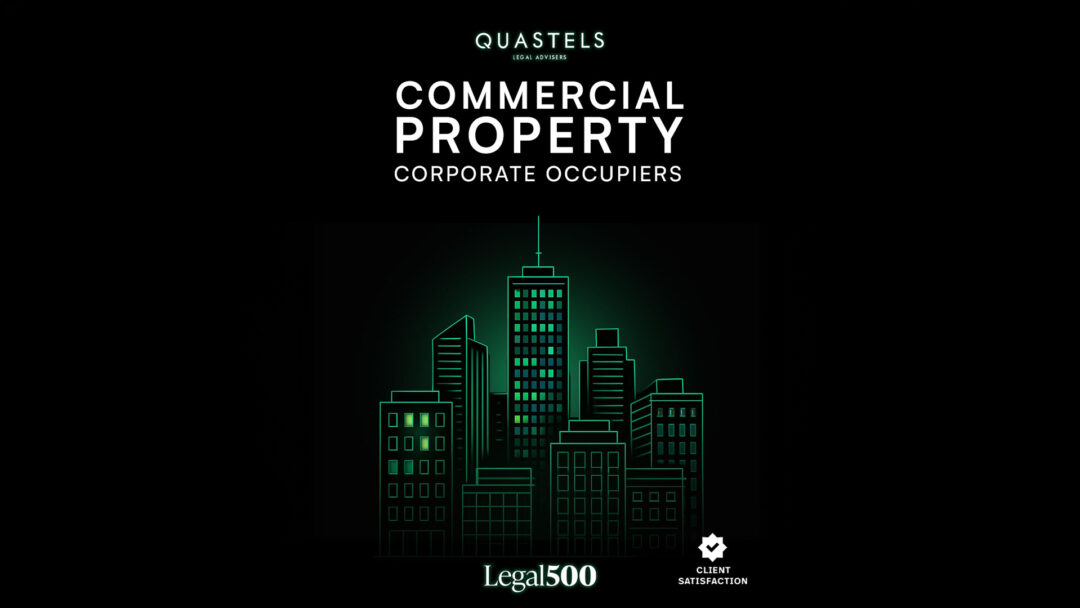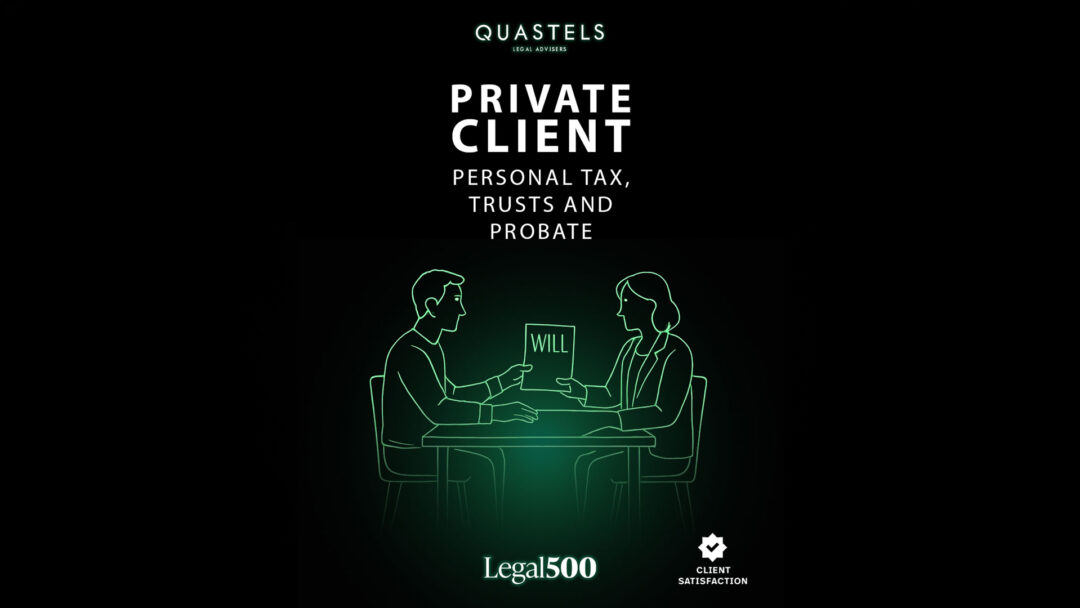Latest Posts

Quastels Recognised in the Legal 500 UK 2026 Rankings
We are pleased to announce that Quastels has been recognised in this year’s The Legal 500 UK 2026 rankings across four categories:
- ‘Leading Firm’ in Commercial Property: Corporate Occupiers
- ‘Leading Firm’ in Private Client: Personal Tax, Trusts and Probate
- ‘Leading Firm’ in Industry Focus: Hospitality & Leisure
- ‘Firm to Watch’ in Industry Focus: Retail & Consumer
We are pleased to have retained our ‘client satisfaction’ badge, which reflects our dedication to exceptional service and expertise across the firm.
About The Legal 500
The Legal 500 is widely regarded as one of the most respected legal directories, evaluating law firms and individual lawyers through rigorous independent research, client testimonials, and industry insight. Earning a place in The Legal 500 reflects a firm’s commitment to delivering exceptional legal services and cultivating strong client relationships.
At Quastels, we are proud of our longstanding reputation for excellence and client care, and we are delighted to be recognised in this year’s rankings.
Key Rankings

Commercial Property: Corporate Occupiers
For five consecutive years, our Commercial Property team has been recognised in the Commercial Property: Corporate Occupiers category.
The ranking highlights our extensive legal expertise, particularly in:
- Portfolio management
- Acquisitions
- Disposals
Our practice spans the retail, leisure, and office sectors, delivering bespoke advice to businesses navigating commercial property matters.
Recognised Legal Professionals
The Legal 500 ranking specifically commends our department heads and key individuals for their contributions:
- Mark Cornelius (Partner and Co-Head)
- Naomi Jones (Partner and Co-Head)
- Jonathan Gross (Partner)
- Aisha Anjum (Senior Associate)
Client Testimonials
The following testimonials have been collated independently by the Legal 500 research team.
“Quite frankly, it’s the team’s proactive nature, the partners are available when you need to speak to them, and they are always trying to provide a solution for you and the underlying client.”
“The team have a deep understanding of our business and tailor their advice accordingly; we know we can rely on them to be concise and responsive to our complex and changing needs.”
“Quastels have gone above and beyond acting on our behalf. The due diligence checks have been extensive, and they utilised relationships with firms abroad to ensure that the recorded notice was served promptly and at a reasonable cost to us as the client.”

Private Client: Personal Tax, Trusts, and Probate
Our Private Wealth team has been recognised for the first time in The Legal 500, in the Private Client: Personal Tax, Trusts, and Probate category.
The ranking highlights our expertise in existing and emerging fields, including:
- Tax
- Trusts
- Succession Planning
- Tax aspects of cryptoassets
Recognised Legal Professionals
The Legal 500 specifically mentions the work and expertise of:
- Ben Rosen (Partner and Head of Department)
- Jack Burroughs (Senior Associate)
Client Testimonials
The following testimonials have been collated independently by the Legal 500 research team.
“This is a team which is high energy, extremely responsive and authentic.”
“Ben Rosen is a delight. He absolutely loves what he does which makes him really fun to work with. He inspires great confidence with clients and has the sort of grasp of complex material to be able to articulate it clearly.”
“Ben Rosen – excellent solicitor. Prepared to go the extra mile for a client. Highly recommended.”

Industry Focus: Hospitality & Leisure
This year, we are pleased to further expand our presence in The Legal 500 rankings, being named a ‘Leading Firm’ in the Industry Focus: Hospitality & Leisure category.
Our Hospitality & Leisure sector offering received recognition for assisting clients across the restaurant, theatre, hotel and pub sectors, amongst others, with key work including:
- Sales
- Restructurings
- Commercial contracts
- Fund structuring
- Asset management
Recognised Legal Professionals
The Legal 500 recognised these key players in our Hospitality & Leisure group:
Client Testimonials
The following testimonials have been collated independently by the Legal 500 research team.
“We have used Quastels numerous times and they can always find a commercial solution to sometimes complex problems, not just looking at the legal ramifications but the commercial ones as well.”
“One of the standout features of Quastels is the diversity within their team – not just in background, but in experience and perspective. This diversity enhances their ability to handle complex, cross-disciplinary issues with nuance and agility.”
“I’m especially grateful to Adam Convisser for his time, expertise, and unwavering support. In moments of stress, he reassured me and guided me through challenges with professionalism, empathy, and clarity. I’ve developed a genuinely strong relationship with him, which speaks volumes about the quality of service and personal attention Quastels provides.”

Industry Focus: Retail & Consumer
We are pleased to have retained our standing as a ‘Firm to Watch’ in the Industry Focus: Retail & Consumer category. Our Brands & Luxury sector offering received recognition for its cross-disciplinary approach, providing legal solutions across corporate, commercial, real estate, employment, and governance issues.
Recognised Legal Professionals
The Legal 500 highlighted the contributions of:
Thank You
We are incredibly proud to be growing our recognition in The Legal 500, which reflects the development of the firm over the past twelve months. A heartfelt thank you to our clients, colleagues and The Legal 500 for their continued support and kind words. Our growing recognition motivates us to continue delivering fantastic service across all of our practice and sector areas.
If you require legal assistance, please contact us, we would be delighted to help.
Read More
Restrictive Covenants: How Employers Can Protect Their Business Interests
In a competitive market the departure of a key employee can put a company’s most valuable information and assets at risk. From confidential material to trusted client relationships, the loss can be significant, and in some cases, irreversible.
Restrictive covenants remain one of the most effective contractual damage limitation tools. However, the law is applied strictly; a clause will only be enforceable if it is reasonable, proportionate, tailored to the individual, and justified by genuine business requirements. With anticipated legislative changes, now is the time for employers to review and strengthen these protections.
What Are Restrictive Covenants?
A restrictive covenant is a contractual term limiting certain activities by the employee after employment ends. Only a narrow range of interests can be legitimately protected, including client connections, confidential information, trade secrets and workforce stability.
The purpose is not to block fair competition, but to prevent unfair advantage gained through access to the employer’s resources and relationships. This distinction matters – restrictions with no clear link to a legitimate business interest are unlikely to be enforceable. If a clause exists solely to prevent a former employee from working elsewhere, it will almost certainly fail.
Restrictive covenants are part of a broader toolkit for protecting business interests. Other measures, such as intellectual property clauses, clear policies on data security, and exit interviews, complement these contractual protections.
Main Types of Post-Termination Restrictions
- Non-compete: prevents the employee from working for a competitor or starting a competing business for a defined period. These are the most difficult type of restriction to enforce and face the highest judicial scrutiny.
- Non-solicitation: prevents the employee from approaching the organisation’s customers, clients or suppliers after they leave.
- Non-dealing: prevents the ex-employee from working with your clients, even if the client initiates contact.
- Non-poaching: prohibits the employee from enticing or encouraging current staff to join them in a new venture or competing business.
Confidentiality obligations apply both during and after employment, operating alongside post termination restrictions. They can be a stronger legal foundation because they are not subject to the same time limits. However, once employment ends, only trade secrets remain automatically protected, so an express confidentiality clause is needed to cover wider information.
In practice, businesses often combine different restrictions. For example, a senior sales executive may be a subject to a non-compete clause of limited duration, a non-solicitation clause covering key clients, and ongoing confidentiality obligations. Layering protections in this way improves enforceability and provides flexibility in the event that one of the clauses is challenged in court.
Are They Enforceable?
To be enforceable, a restrictive covenant must be reasonable in scope, duration and geography. There is no “one size fits all” approach. For example, a restriction suitable for a sales director may not be justified for a junior manager, even if they both work in the same department.
The restrictive covenant must go no further than is necessary to protect the specific commercial interest, such as safeguarding client relationships or protecting confidential know-how. It’s also important to bear in mind that enforceability is assessed at the time the covenant was agreed, not when the employee leaves. Therefore, it is important for employers to review and update restrictions after promotions or significant changes in role.
If a clause is found to be too broad, for example, covering clients the employee never dealt with or applying to an unreasonably wide geographical area, or lasting longer than necessary, a court may strike it out entirely rather than rewrite it.
Each covenant should therefore be tailored to the employee’s actual responsibilities and supported by a clear, evidence-based justification for its terms.
Anticipated Legal Changes
The government has proposed a statutory cap of three months on non-compete clauses in employment contracts. While not yet implemented, this change would require employers to place greater emphasis on the other types of restrictions, such as non-solicitation and garden leave provisions to maintain protection. Garden leave is a period during an employee’s notice when they remain employed and continue to receive salary and benefits, but are typically not required to attend the workplace and are often restricted from performing their normal duties, engaging with clients, customers or colleagues, or starting new employment with a competitor.
The courts are also continuing to reinforce the importance of up to date, role specific drafting, particularly after promotions or internal restructures.
Why Should Businesses Review Existing Restrictions?
With legal reforms pending and enforceability challenges increasing, businesses are recommended to review existing clauses as an opportunity to:
- Identify gaps and areas of risk, particularly following promotions or change in job roles of individuals;
- Review too wide geographical areas or definitions and provisions that will stand up to scrutiny; and
- Ensure that all documentation reflects the employee’s current role and responsibilities, reducing the risk of disputes and strengthening enforceability in court.
The aim is not to exclude employees from the market indefinitely, but to preserve the core relationships, information and goodwill on which businesses rely.
To discuss the contents of this article, please contact our Employment team via the form below.
Read More
The $100,000 Question: Why US Tech Needs a UK Base Now
When President Trump signed off on a $100,000 fee for every new H-1B visa petition last weekend, the ripple effect was immediate. Investors asked whether startups could still afford to bring in overseas engineers. HR directors scrambled to recalculate hiring budgets. And for global talents, the designers, coders and data scientists who have long seen Silicon Valley as the promised land the message was unmistakable: the United States is no longer the easy first choice.
The H-1B has always been political football, but this change marks something different. It transforms the cost base of hiring, and in doing so, it forces US tech firms to ask a bigger strategic question: where else can they build teams, attract world-class people, and still connect seamlessly with their American operations?
The answer, increasingly, is London.
Why London?
The UK has positioned itself, almost by accident, as the most natural hedge against US immigration volatility. Visa fees are not insignificant, but they are predictable. There is no lottery. A sponsor licence can be secured in weeks, and once you have it, visas for new hires can be processed just as quickly.
For companies used to rolling the dice each March on the H-1B lottery, that certainty is transformative. It means talent strategy can be planned rather than prayed for.
The timing also matters. London sits in the sweet spot between California and Bangalore, overlapping with both in a single working day. For distributed teams and round-the-clock development cycles, that time zone advantage is worth almost as much as a tax break.
More Than a Safety Net
It would be a mistake to see the UK only as a fallback for those priced out of the H-1B. The country has been quietly redesigning its immigration system with tech in mind.
The Skilled Worker route, while more expensive than it once was, offers stability and a path to settlement. The Global Talent visa endorsed by Tech Nation remains one of the most flexible unsponsored routes in the world. And the Scale-up visa is designed for precisely the kind of high-growth firms that usually cluster in San Francisco or New York.
Combine those options with London’s financial markets, venture ecosystem and cultural cachet, and the UK starts to look less like a Plan B and more like a genuine alternative centre of gravity.
The Cost Argument
The hard numbers tell their own story. Sponsoring a skilled worker in the UK involves licence fees, an immigration health surcharge, and the visa itself. For a five-year hire, the all-in cost is measured in the low tens of thousands of pounds. Compare that with a flat $100,000 fee before you even pay wages in the United States, and the business case begins to write itself.
The fee will not deter the largest tech companies, who can absorb it as a cost of doing business. But for mid-sized players and scale-ups the very firms most responsible for innovation and job creation it could be fatal. A UK office is no longer just a growth play, it is a survival strategy.
The Strategic Pivot
What we are seeing is a shift in mindset. For decades, the default was simple: if you wanted to scale in tech, you built in the US and dealt with immigration headaches as best you could. Now the calculation is different. A physical footprint in the UK is a release valve: a place to hire international talent without political whiplash, a platform to reach European markets, and a credible base that investors understand.
This does not mean abandoning America. The US market, capital and ecosystem are still unrivalled. But the smartest companies are already thinking in terms of dual anchors: Silicon Valley for scale, London for stability.
Conclusion
The $100,000 H-1B fee has turned a visa into a luxury product. For the companies who cannot justify that spend on every new engineer or product lead, the UK offers a rational, strategic alternative.
The firms that move early, incorporating, licensing, and embedding compliance in London will have a head start. They will be able to keep hiring globally while their competitors are paralysed by costs in the US.
The message is clear: if you are a US tech company serious about resilience, you no longer just want a UK presence. You need one.
Get in touch with our Corporate Immigration team via the form below.
Read More